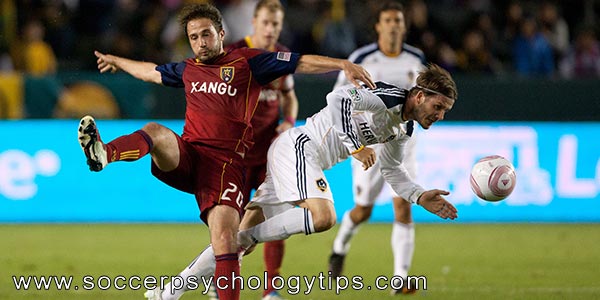
Returning to Play After Injury
Soccer injuries can lead to a host of challenging problems for players.
Many soccer players can deal with the physical pain from injuries, but the mental and emotional challenges can last long after the injury is healed.
If you don’t meet these challenges head on, you will hold yourself back from playing at your peak.
One injured soccer player from our Mental Game of Soccer Survey expressed several concerns regarding her injury.
“How can you build mental toughness and self-confidence after coming back from an injury to a coach that no longer believes in you? Also, how can you build up motivation to do extra work so you can perform better?”
Your injury has multi-layered challenges:
1. How to confidently return to competition after an injury.
2. How to deal with a coach who no longer believes in you.
3. How to build motivation to improve performance on the pitch.
Your injury scenario most likely unfolds as follows: You have played significant minutes for your team and were playing at a high level.
Unfortunately, a serious injury causes you to miss significant time away from practices and games. Rehab is tough but not as difficult as watching your teammate replace you.
As your replacement succeeds, you become more and more fearful that you will not regain your previous role on the team. Even when you return to practice, your coach doesn’t seem to give you the same amount of attention and feedback.
You feel like your coach has lost faith in you which is a blow to your confidence. You want to push harder in practice and work on increasing your speed and agility, but you are afraid you may reinjure yourself.
Even if you do extra work, you wonder if it would even matter since your coach shows little interest in you anymore.
When faced with these challenging circumstances, you can either see the situation as unfair or see the situation as an opportunity to push forward and prove something to yourself.
Rising to the challenge is a characteristic of mentally tough athletes.
Let’s get right into the solution… Being mentally tough is a matter of taking action and being proactive. One positive step is to ask your coach, “What can I do to contribute to the team?”
This question opens up a dialogue with the coach and gives you feedback as to what you can do to better your game.
Taking initiative is taking personal responsibility for the further development of your game.
When you take positive steps you build confidence, increase motivation and feel empowered.
Dealing with Returning to Competition After Injury
“How can I best help the team?” Asking your coach is the first step in a successful return to competition. The second step is to take your coach’s feedback and put it into action.
Identify 1-3 steps you can take to put your coach’s feedback into action. At the end of the week, discuss your progress with your coach.
Keep in mind that it’s normal to lose some confidence when you return and wonder if your game will return to the same level as before your injury.
Be patient with your game and confidence to return to normal when you start back.
Related Sports Psychology Articles
- How to Manage a Long-Term Soccer Injury
- How to Cope with The Mental Scars After Injury
- How to Regain Confidence After An Injury
- Subscribe to The Sports Psychology Podcast on iTunes
- Subscribe to The Sports Psychology Podcast on Spotify
Download a free sports psychology report to improve your mental game!
Learn more about our one-on-one mental game coaching.
Get the Mental Edge – With Mental Training

Do you perform well in practice, but find yourself under-performing in games? Do you doubt your skills and second-guess yourself under pressure? If so, mental training will help you reach your goals in soccer. Many soccer players have the skill but are held back by low confidence and lack of pregame mental preparation!
You can get expert mental coaching with us from anywhere. Meet with us via Zoom, Skype, FaceTime or phone call. With today’s video technology, we are able to connect with athletes and coaches all over the globe.
Call Us Today to Schedule Your Free 15-Minute Session.
Find Out How You Can Benefit From One-on-One Mental Coaching!
888-742-7225 | 407-909-1700
